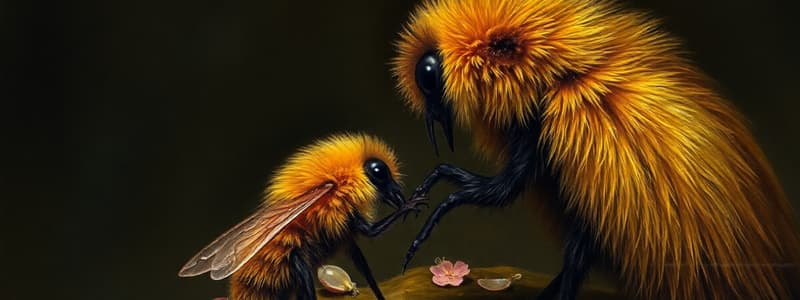Podcast
Questions and Answers
What action does the speaker initially consider taking to the mite on the paper?
What action does the speaker initially consider taking to the mite on the paper?
- Stopping it with a period of ink (correct)
- Ignoring it completely
- Capturing it with a jar
- Observing it closely without interference
How does the speaker describe the mite's reaction to the pen?
How does the speaker describe the mite's reaction to the pen?
- It ran towards the pen with curiosity
- It displayed no awareness of the pen
- It boldly approached the pen with confidence
- It hesitated and showed suspicion of the pen (correct)
What does the speaker hope for the mite at the end of the poem?
What does the speaker hope for the mite at the end of the poem?
- That it sleeps and finds comfort (correct)
- That it eventually dies peacefully
- That it leaves the paper quietly
- That it finds food and thrives
What sentiment does the speaker express regarding their view of life and intelligence?
What sentiment does the speaker express regarding their view of life and intelligence?
What does the poet suggest about the mite's abilities?
What does the poet suggest about the mite's abilities?
What can be inferred about the speaker's perception of the mite's intelligence?
What can be inferred about the speaker's perception of the mite's intelligence?
Which emotion does the speaker NOT express towards the mite?
Which emotion does the speaker NOT express towards the mite?
What is the speaker's final sentiment towards the mite's existence?
What is the speaker's final sentiment towards the mite's existence?
What moment demonstrates the mite's instinct for survival?
What moment demonstrates the mite's instinct for survival?
What does the speaker imply about the relationship between thought and existence?
What does the speaker imply about the relationship between thought and existence?
What is the speaker's primary reaction upon noticing the mite on the paper?
What is the speaker's primary reaction upon noticing the mite on the paper?
How does the speaker characterize the mite's actions when it interacts with the manuscript?
How does the speaker characterize the mite's actions when it interacts with the manuscript?
What does the speaker imply about the nature of intelligence as observed in the mite?
What does the speaker imply about the nature of intelligence as observed in the mite?
What underlying theme about life and existence is suggested through the speaker's interactions with the mite?
What underlying theme about life and existence is suggested through the speaker's interactions with the mite?
How does the speaker ultimately feel about their decision to let the mite remain on the paper?
How does the speaker ultimately feel about their decision to let the mite remain on the paper?
Flashcards are hidden until you start studying
Study Notes
Encounter with a Mite
- The speaker encounters a tiny mite on a sheet of paper.
- The speaker initially intends to kill the mite with a pen but is captivated by its behavior.
- The mite demonstrates intelligence by moving with purpose, pausing, and seemingly smelling or drinking.
- The speaker observes the mite's fear and desperation as it tries to avoid being killed.
- The speaker, despite a personal lack of "collectivistic regimenting love," develops empathy for the mite.
- The speaker chooses to leave the mite alive and hopes it sleeps.
- The speaker celebrates the mite's display of mind, acknowledging the inherent value of intelligence in all forms.
The Encounter
- The speaker observes a tiny speck moving across a piece of paper.
- The speck is not dust, but a living mite with its own movements and intentions.
- The mite exhibits caution and fear when confronted by the speaker’s pen.
- It shows intelligence and a desire to survive, engaging in behaviors like drinking or smelling.
- The mite’s small size and lack of visible feet suggest a complex structure and internal mechanisms.
- The speaker recognizes the mite’s fear, cunning, and desperation for survival.
- The speaker contrasts their own individualism with the collectivist views of the modern world.
- Despite the minimal interaction, the speaker experiences a sense of connection and respect for the mite.
- The encounter reveals the speaker’s appreciation for the presence of mind in any form, even in the most unexpected places.
The Encounter
- The speaker is writing on a white paper sheet when they notice a 'mite' on the paper.
- The speaker initially considers it a dust speck but recognizes it as alive and having "inclinations".
- The mite acts independently of the speaker, showing curiosity and caution towards the pen.
- The mite shows a clear intent to survive by moving away from the drying ink and towards the undried part of the manuscript.
- The mite displays intelligence and a clear sense of self-preservation, despite its small size.
- The speaker observes the mite's fear, cunning, and eventual desperate acceptance of its fate.
- The speaker's reaction highlights a contrast between the "collectivistic regimenting love" that dominates the modern world and their individualistic perspective.
- The speaker chooses to allow the mite its life, despite its seemingly negligible existence.
- The speaker emphasizes the importance of recognizing individuality and valuing life, even in its simplest forms.
- The speaker expresses joy at finding even a small display of mind in a seemingly insignificant creature.
Studying That Suits You
Use AI to generate personalized quizzes and flashcards to suit your learning preferences.




